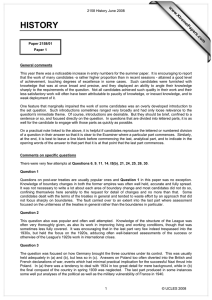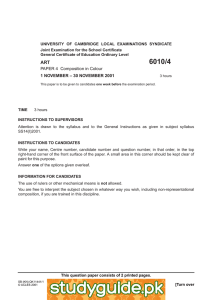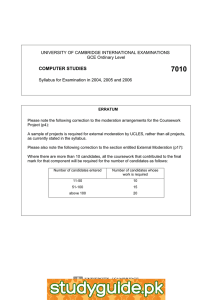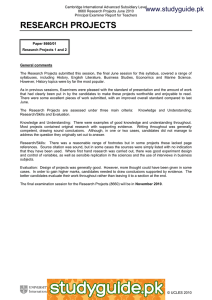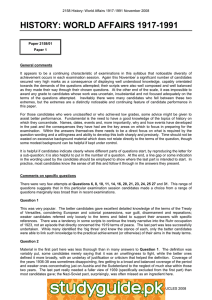HISTORY
advertisement
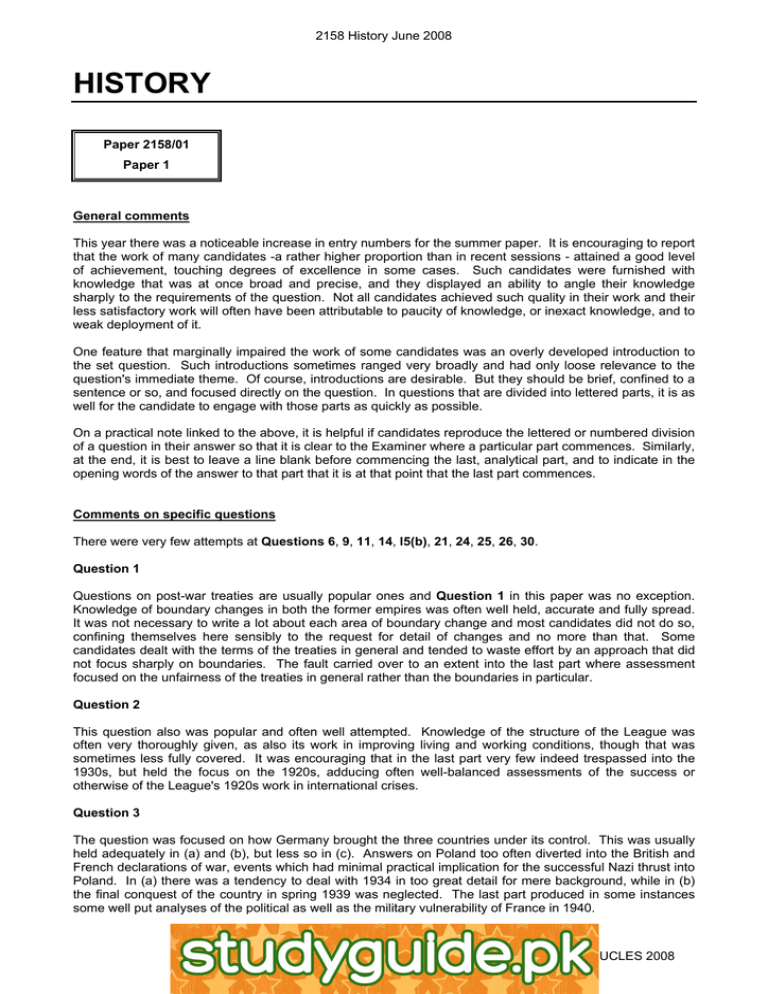
2158 History June 2008 HISTORY Paper 2158/01 Paper 1 General comments This year there was a noticeable increase in entry numbers for the summer paper. It is encouraging to report that the work of many candidates -a rather higher proportion than in recent sessions - attained a good level of achievement, touching degrees of excellence in some cases. Such candidates were furnished with knowledge that was at once broad and precise, and they displayed an ability to angle their knowledge sharply to the requirements of the question. Not all candidates achieved such quality in their work and their less satisfactory work will often have been attributable to paucity of knowledge, or inexact knowledge, and to weak deployment of it. One feature that marginally impaired the work of some candidates was an overly developed introduction to the set question. Such introductions sometimes ranged very broadly and had only loose relevance to the question's immediate theme. Of course, introductions are desirable. But they should be brief, confined to a sentence or so, and focused directly on the question. In questions that are divided into lettered parts, it is as well for the candidate to engage with those parts as quickly as possible. On a practical note linked to the above, it is helpful if candidates reproduce the lettered or numbered division of a question in their answer so that it is clear to the Examiner where a particular part commences. Similarly, at the end, it is best to leave a line blank before commencing the last, analytical part, and to indicate in the opening words of the answer to that part that it is at that point that the last part commences. Comments on specific questions There were very few attempts at Questions 6, 9, 11, 14, l5(b), 21, 24, 25, 26, 30. Question 1 Questions on post-war treaties are usually popular ones and Question 1 in this paper was no exception. Knowledge of boundary changes in both the former empires was often well held, accurate and fully spread. It was not necessary to write a lot about each area of boundary change and most candidates did not do so, confining themselves here sensibly to the request for detail of changes and no more than that. Some candidates dealt with the terms of the treaties in general and tended to waste effort by an approach that did not focus sharply on boundaries. The fault carried over to an extent into the last part where assessment focused on the unfairness of the treaties in general rather than the boundaries in particular. Question 2 This question also was popular and often well attempted. Knowledge of the structure of the League was often very thoroughly given, as also its work in improving living and working conditions, though that was sometimes less fully covered. It was encouraging that in the last part very few indeed trespassed into the 1930s, but held the focus on the 1920s, adducing often well-balanced assessments of the success or otherwise of the League's 1920s work in international crises. Question 3 The question was focused on how Germany brought the three countries under its control. This was usually held adequately in (a) and (b), but less so in (c). Answers on Poland too often diverted into the British and French declarations of war, events which had minimal practical implication for the successful Nazi thrust into Poland. In (a) there was a tendency to deal with 1934 in too great detail for mere background, while in (b) the final conquest of the country in spring 1939 was neglected. The last part produced in some instances some well put analyses of the political as well as the military vulnerability of France in 1940. 1 www.xtremepapers.net © UCLES 2008 2158 History June 2008 Question 4 A degree of background - though not extensive - was often seen as a viable start to a narrative of the Korean War. Knowledge of the ebb and flow of military events across the Korean peninsula was in many instances sound and the United Nations, more than individual countries, brought usefully into that context. The mark scheme urged some generosity on the slightly demanding last part, though a number of answers here got beyond a basic political contrast to an indication of policies in action that led to border friction. Question 5 The definition produced problems for only a very few number of candidates and the subsequent illustration of detente in action was often developed with useful detail and balance. Negative points - e.g. Vietnam - were sometimes introduced to emphasise that the ideal was not always held to and only rather few developed Vietnam to a point where irrelevance was beginning to set in. The final part was in many cases well developed from the earlier accounts, with references to changed attitudes in the early I980s. Question 7 The first part was usually well attempted, candidates generally availing themselves of the opportunity to write both on domestic and on foreign affairs in the Weimar years. There was a tendency at times for the focus to shift from the 'policies' pursued during these years in favour of a general history of Weimar Germany, in which policies almost inevitably emerged, though less sharply defined. For some there was a time factor problem in the last part, with too much attention to Hitler's progress in the 1920s. Others got well into the electoral and state politics that surrounded his appointment as chancellor and comparatively few went beyond January 1933. Question 8 German and Italian questions are usually the most popular in this section and in this examination the Italian one was more popular than the German one. Parts (a) and (b) were usually well covered, though in (a) general material marred some answers and in (b) anti-clerical opinion was sometimes placed with the early fascist state, rather than with the early state of Italy in the late nineteenth century. Part (c) lacked detail and rigour and was too generally addressed; no candidate made mention of the Balilla. While some responded to the last part with a general assertion of dictatorship, others teased out various features of fascist Italy to suggest a more balanced approach. Question 10 Rather surprisingly, this was not a particularly popular question. Those who attempted it generally did well, certainly recognising the significance of each in the overall context of the Second World War. ‘Events’ were often given weight over ‘outcome’, though some candidates dealt with both by producing effective and sound knowledge. However, the last part failed to evoke adequately precise knowledge or useful assessment based on it. Question 12 Answers here were not numerous and were almost entirely disappointing. Focal areas in the first part might have been the entry into the war, the Fourteen Points and Wilson's peace-keeping role. Yet few got to these features and even fewer developed them with assurance. The last part was somewhat better attempted, and there were some helpfully based counter arguments to the given theme. Question 13 The strength of this answer lay, in almost all cases, with the legislative package that held the key to the answer to the middle part. Knowledge here was in almost all cases broad and exact. The first part was too often briefly dismissed, yet there exists a wide range of references that might be adduced to provide a full answer here. The last part often had well based reasons for opposition -ranging across the political spectrum - but might have been further enhanced by allusion to the political concerns of some of FDR’s opponents in the 1930s. 2 www.xtremepapers.net © UCLES 2008 2158 History June 2008 Question 15(a) It is not usual to find so marked a degree of popularity in the Latin American question, though Cuba is usually more popular than most other areas. All aspects of the question were well recognised, even the Bay of Pigs episode (which often gets confused with the Missile Crisis) being appropriately handled. There was something of a dearth of knowledge on the precise policies followed by Castro in power, Batista's rule sometimes evoking fuller references. While the last part was usually reasonably well handled, it was surprising that the Missile Crisis in too many cases was neglected here. Question 16 There were some good answers to this very broadly based question, covering three very different presidents. The focus in the case of the first two was well held and while there might be marginally more material relevant in this context for Nixon than for Carter, many did produce good foreign and domestic references to help explain Carter's defeat. The concept of 'general popularity’ was usually well grasped for Reagan, many expanding on his twin role as screen star and father figure. Question 17 Here perhaps more than in any other question in the paper there was a strong temptation to develop much background for (a). This was understandable and the better candidates limited this, while weaker ones went back to 1905 and even the late nineteenth century. The question did require a specific 1917 focus and, given the parameters of the syllabus it would have been inappropriate to expect knowledge above the level of background knowledge on pre - 1917 events. A tendency with some was to narrate 1917 and allow relevance to be found where it lay. Both (a) and (b) required a sharp, particular focus and this was not always forthcoming. The last part was also somewhat disappointing, with neglect of the precise reasons for intervention in favour of a wartime narrative. Question 18 The quotation is so naturally linked to the work of Stalin in the 1930s that of itself it provided no difficulties. Many had good knowledge on (a) and (b), though others were less secure and less well developed. In handling five-year plans, while statistical data can have value and the objectives of particular plans can have relevance, it is more important to get into the 'ethos' of the planned economy, indicating methods and approaches. In the last part, trade was seen as a fairly natural development from the first part and others got to the Nazi-Soviet pact, yet no one at all got to the popular front movement of the mid-thirties, a regrettable omission. Question 19 It was again surprising that, rather like the comparable Question 10, this also received few responses. It was perhaps not so well done as Question 10, with balanced accounts across the given years being less frequently found than concentration on particular events such as Stalingrad and Kursk. It is surprising that the siege of Leningrad continues to be a comparatively neglected event in this context. Answers to the last part were not very well supported though in most cases were developed quite purposefully from the bitterness of the times. Question 20 Rather as in answers to Question 18, both (a) and (b) could have been more fully developed than they were. Most were able to indicate successes and failures in both areas, but the fundamental nature of Khrushchev’s policies eluded many. The last part was rather better undertaken, with some well supported assessment offered. Question 22 This was not a particularly popular question. As on other occasions when questions have been set on this topic, knowledge was rather narrow. Part (a) does involve references to warfare as well as to policies, yet neither was much in evidence. Part (b) requires a fuller description of domestic policies than was usually forthcoming. Had (a) and (b) been thoroughly attempted, the analysis required in the last part should have had a degree of liveliness about it. Yet only bland responses were forthcoming. 3 www.xtremepapers.net © UCLES 2008 2158 History June 2008 Question 23 Answers varied a good deal in the degree of support that was forthcoming here, yet few mistook the wars and all were aware of their basic significance. Some usefully buttressed their descriptions with useful comment on the fitting of the wars into great-power politics. The last part needed in most cases to get beyond the basic concept of a besieged land to such considerations as support, expertise, finance. Question 27 A distinctly popular question and most who attempted it gave a viably orientated though not always sharply supported answer. Some neglected to observe that the question's focus was on the Communist Party and not on a history of China in general; the KMT, for example, had relevance only to the extent of its links, friendly or otherwise, with the Communist Party. There was often a rather blurred area between the first and second parts, with narrative and analysis of the 1940s running together and the latter approach not emerging with sufficient strength. Question 28 The rather few answers to this question were generally disappointing. Answers to the first part were uninformed and often brief, with much potential missed; there seemed particular paucity on Japan’s advance in the early 1940s. The last part received only weak answers, poorly argued and poorly referenced. Question 29 While Gandhi, Jinnah and Mountbatten were quite well covered, Bose was often just not known and omitted. He does play an important - almost unique - role in the 1940s, as a minority of candidates sometimes quite graphically expressed. There was plenty to go for in the last part, and answers here were usually balanced and reasonably informed. Question 31 Answers were usually well informed in all areas. In (a) there was a tendency to go straight for collectivisation rather than to consider the initial period of land seizures. But answers to (b) were generally secure, while knowledge of Deng in both (c) and the last part was usually full. It would appear that knowledge of more recent Chinese history is better held than knowledge of more recent Soviet history. 4 www.xtremepapers.net © UCLES 2008
